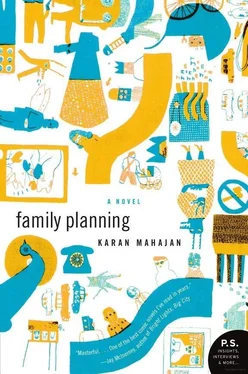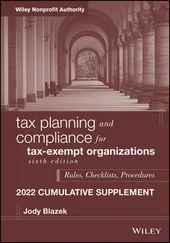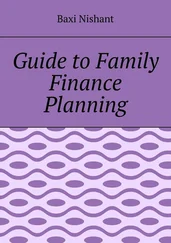He was glad he had a city to save him from his personal embarrassment.
No — he was glad the city hadn’t yet collapsed.
He needed to discuss Rashmi with Arjun before he himself was subsumed by political problems. He’d been postponing the inevitable discussion for years, but today he’d almost barked the secret out at his son. This wouldn’t do: a proper father-son talk was needed.
Mr. Ahuja closed his eyes as the car varoomed under the overpass, its belly sculpted like the chassis of a 747. Two wings of foliage dropped on either side; cool, corrosive dampness fumigated the car. Then they were out, and Mr. Ahuja was looking up and over his shoulder. A banner attached to the front of the flyover was fluttering precariously in the wind and asking a poignant question about AIDS, which actually turned out to be a poignant way of advertising the quiz-show Who Will Win One Crore Rupees?
Everything about that first marriage to Rashmi had been plagued by contradictions — his initial wise-assed refusal to have an arranged marriage (he had shaggy hair and razor-sharp sideburns and an IIT degree in those days), his parents’ coy compromise (“Well, see some girls, you don’t have to marry them”) and his final defeat (marriage). He had chosen defeat. Rashmi was beautiful, a wispy Punjabi girl with cheeks that seemed curiously drawn in, and a nose that cast a perfect shadow on her upper lip. He saw her in his own house, both sets of parents looking on sheepishly as the boy and girl interacted mechanically and formally. After they left, he told his parents: “No, there’s no way I am going to have this nonsense arranged marriage.” He knew he was breaking their hearts; they were ailing, they wanted to see him settled. But he had pledged revenge on his parents and he couldn’t remember why — wasn’t it because they themselves had had an awful married life, because they had sent him away to boarding school, because their constant fighting had made him feel so insignificant, so ignored as a child?
Later that day, however, he stooped over the gray, unwieldy phone in the verandah and listened for footsteps. Then he circled the phone. He cut wide arcs, then smaller arcs. Momentarily, he leaned against the bookshelf, whistling. Finally he swooped down on the damn thing and called Rashmi and asked her on a date and they went on a date and they went on many dates thereafter (all unknown to the four sheepish parents) — Rakesh gingerly holding her hand during the screening of Sharaabi ; Rashmi leading him to a secret spot in Humayun’s tomb where they kissed over the musty coffin of a dead Mughal courtier; both ducking into the old communist haunts of Connaught Place and smoking cigarettes. He loved her for her indignation, her anger at the way New Delhi’s colonial airs distracted from the actuality of its massive slums — and her unwillingness to let that make her bitter or sad. She was the most earnest person he knew, and something of that earnestness played against his own sense of tragic irony, of rejection, and bloomed into romance.
No one knew of this romance, least of all his parents who had given up hope for their son. To them, Rakesh appeared to be losing his mind. He had just finished his four years at the Indian Institute of Technology in Delhi, earned a bachelor of science degree (with distinction!) in civil engineering — the most marriageable and marketable degree of his time — and now he wanted to do what? He wanted to enter the Indian Administrative Service, the IAS. The unimaginable: he wanted to shed the world of logical remuneration that had been planned for him, play the intellectual lottery of the civil service, become a babu . He wanted to shape cities, be a servant of the Public Works Department. Rakesh’s parents thought they had lost everything, and the exhaustion of keeping their only child on track as he veered away from them would have killed them if he hadn’t come in one day and said: “MamaPapa. I want to marry Rashmi.”
He told them everything. His own revenge had failed him.
Rashmi and Rakesh were married. The marriage had many highlights, yet nothing filled Rakesh with greater elation than sitting on the faux-throne during his wedding reception and having relative after relative come and pay obeisance (and cash, of course) to the stunning married couple. He liked sitting on the dais and hooking visitors with his eyes and then watching them proceed to greet him. It was a benign, harmless science, and yet — it required skill, to maneuver people, to engineer their fates in a way that was best for everyone. That was true engineering. Days later, he entered the room for the Administrative Service exam like a conqueror, smirking at the invigilator. But sitting at the desk, a married man, no longer a virgin, all he had were dreams of grandeur, images of gaunt architects poring over drafts of New Delhi and Chandigarh — his feet pattering alongside Rashmi’s through the perfect city. He was so in love that he failed the exam.
Now, academically thwarted, he sent last-minute, desperate applications to American colleges. He was accepted by the BR Institute in Vermont for a PhD in civil engineering. It wasn’t the best program but he went anyway. Rashmi enrolled in a journalism program at the same school and Rakesh acquainted himself with the vast boredom of suburbia and the glimmering perfection of American design. He disliked America; he felt self-conscious being the only Indian in a hundred-mile radius; he wished he could be back among Delhi’s teeming millions. Even Rashmi, comfortable in any setting, felt lonely. And then, deep into their first white winter, their longing for India exaggerated, both unable to handle the desiccation of central heating, Rakesh joked, “It’s too cold in this country to do it with a condom.”
Nine months later they had Arjun.
Arjun changed everything. If before Rakesh had felt obligated to stay in America (he wanted to prove to his father that he was responsible), in Arjun he found the perfect reason to return home — didn’t they want their son to be Indian? Didn’t his grandparents want a part in bringing him up? How would Rashmi cope on her own? But, surprisingly, Rashmi was the one who wanted to stay. She wanted clean air for her son (Delhi had made her asthmatic), safe roads, crisp winters, an idyllic American childhood. Rakesh told her there was no such thing — that she enjoyed being an exotic foreigner too much. Immediately he felt bad. Immediately she reminded him that if it weren’t for him, they’d never have moved.
“I’m going for a drive,” she added.
They’d been arguing all day.
“Look, I’m sorry.”
“There’s no point being sorry,” Rashmi said. “You’ve ruined the day. It’s the one beautiful Sunday we’ve had in months and it’s ruined. You want complete control. If you don’t get it, you’re like a child. You start snapping.”
“You’re right. I’m sorry. I shouldn’t have said that. You’re not exotic at all. You’re a homely convent educated girl with B.A. and fair and lovely skin .”
“Rakesh!”
“I’m only joking, darling!”
“I’m only going for a drive.”
Rakesh held her playfully at the door. “Look. The babysitter’s here. What will I do? What is a man to do in such a situation? How should a man in the twentieth century keep himself busy while his baby is sat?”
She laughed. “You should propose to her and take her back to India. She’s fairer than I am. Your mom and dad will be pleased.”
Eventually, after much cajoling, he made a deal with her that he be allowed to sit in the car as well, and Rashmi agreed on the condition that they wouldn’t exchange a word the entire time — if she went shopping in the mall, he’d shiver and quake in the parking lot with his hands thrust into his pockets; if she pulled into a gas station, he’d not be the least bit chivalrous and would in no situation offer to fill up the car and would instead fiddle with the knobs of the stereo like a distracted boy. Rakesh agreed to all these ridiculous terms because he’d always feared the worst from Rashmi’s angry solitary drives (she was willful but absentminded), and he felt better, as the object of her rage, being by her side.
Читать дальше












